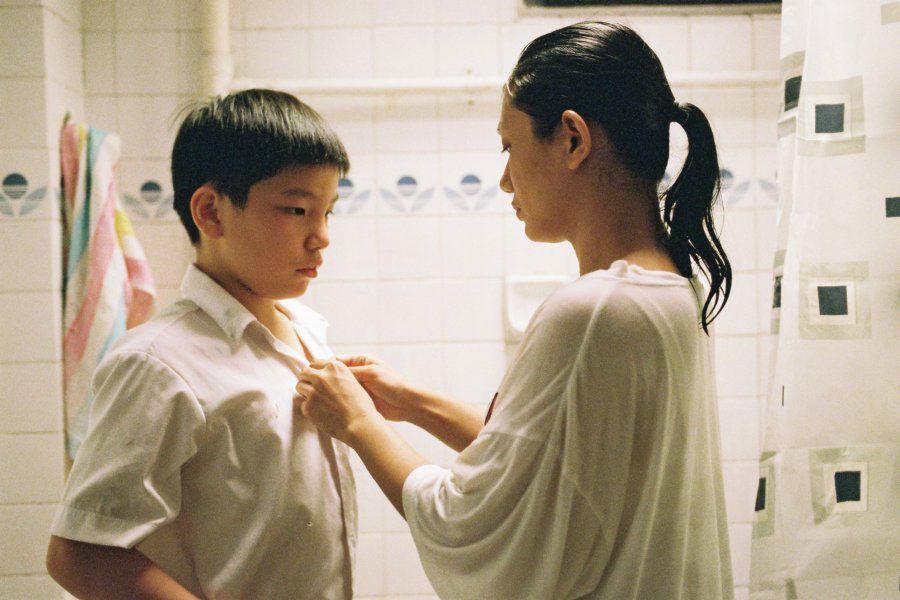By Chlotrudis Independent Film Society
Rating: 4.5 cats
Director: Anthony Chen
Starring: Angeli Bayani | Koh Jia Ler | Tian Wen Chen | Yann Yann Yep

Country: singapore
Year: 2014
Running time: 99
IMDB: http://www.imdb.com/title/tt2901736/combined
Jason says: “You can finish ILO ILO and come away feeling like you’ve seen something more uplifting than it really is, and it would not shock me if a fair amount of people identified with the parents of a problem child, especially in the film’s native land of Singapore. The tone of this film is carefully managed, enough so that it does not necessarily feel like it is condemning the exploitation of foreign workers depicted – at least, not until the pieces have been separated, added up, and put back
together.
“The kid on question is Jiale (Koh Jia Ler); he’s constantly in trouble at his school and not much less trouble at home. Mother Hwee Lang (Yann Yann Yep) and father Teck (Tian Wen Chen) are stretched thin as it is, so they do what a number of families in a similar position do and hire a servant. A placement agency send them Teresa (Angeli Bayani), who had left her own child with family back in the Philippines to take this job, and while Jiale initially treats her even worse than his parents, a bond eventually forms that Hwee Lang finds threatening.
“There’s a scene a bit past the midpoint of the film that initially comes off as just sort of darkly funny: Jiale has been given a clutch of cute baby chicks to raise as pets for his birthday, and as he runs out to the balcony to play with them, the camera swings back to the living room to remind the audience that the family was having fried chicken for dinner. It doesn’t quite become the movie’s central metaphor, but the meaning isn’t hard to extract as things play out a bit more; Teresa may feel like part of the family, but given that Hwee Lang is holding onto her passport ‘for safekeeping’, she is in a bit of a cage as well – and a housemaid can be a luxury in the same way as a pet chicken.
“That’s especially true in the time when this story plays out, 1997-1998, when Singapore was one of many countries whose economies suffered as real estate bubbles burst and reckless investing came back to bite people. Chen doesn’t spend a lot of time talking about this issue directly, but it’s never far away; there are plentiful subplots and side-stories involving belt-tightening, keeping up appearances, and despair when that is no longer possible. Without ever particularly raising his voice about it, Chen makes a two-pronged attack on contemporary society: Certainly, the way people like Teresa are exploited is shameful and possibly illegal (the film doesn’t go into the specifics of Singaporean employment and immigration laws), but it’s also a symptom of an economy driven by pride and lies.
“Much of that is going on underneath the surface, and shouldn’t completely overshadow that the bit on top, where Teresa’s more hands-on beginning makes a difference in Jiale’s life. Koh Jia Ler is given the part of a little monster to start with, and he’s impressively unpleasant in the part, although he seldom crosses the line to actually being a psychopath. A lot of the film rests on his shoulders, but he’s always genuine, even if not always likable. Angeli Bayani is even more central as Teresa, and she does a fine job of presenting the character as on shaky ground and knowing it, with a fine combination of uncertainty and confidence in herself that certainly draws the audience’s sympathy without transforming it into pity. It’s an engaging performance that gets the audience into the character without having to recite a lot of details. Tian Wen Chen and Yann Yann Yeo do well in their parts as well, delivering well-rounded performances as characters it would be very easy to simply dislike.
“A great deal of ILO ILO is like that: Very well done, if not necessary astonishing on first blush. A closer examination, though, reveals an exceptionally well-constructed movie, one that reveals more the closer one looks at it. 4.5 cats
“Seen 17 March 2014 in the Studio Cinema (Belmont World Film, digital)”
Julie says: “The acting in this film was impeccable. Story was predictable but worth watching nonetheless.
Set in Singapore during the 1997 Asian financial crisis. ILO ILO chronicles the day-to-day drama of the Lim family – troublesome grade-schooler Jiale and his overstressed parents, Heck and Leng. Comfortably middleclass and with another baby on the way, they hire Teresa, a Filipino immigrant, as a live-in maid and nanny. An outsider in both the family and Singapore itself, Teresa initially struggles to manage Jiale’s antics and find her footing in her new community…
“Watching the interview with the mother was amazing as she was unrecognizable in both physical appearance and demeanor. I see nominations for her for best supporting actress or possibly best actress.
“The director mentions in an interview how he and many others were brought up by their Nannies so he wanted to tell this story which was personal to him.
“The financial crisis mirrors the most recent crisis so it’s a timely movie as well. One that people can relate to on many levels.”
